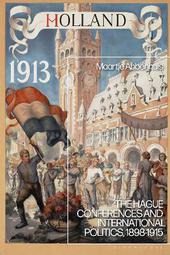
|
The Hague Conferences and International Politics, 1898-1915
Paperback / softback
Main Details
| Title |
The Hague Conferences and International Politics, 1898-1915
|
| Authors and Contributors |
By (author) Maartje Abbenhuis
|
| Physical Properties |
| Format:Paperback / softback | | Pages:304 | | Dimensions(mm): Height 234,Width 156 |
|
| Category/Genre | World history |
|---|
| ISBN/Barcode |
9781350159679
|
| Classifications | Dewey:327.0904 |
|---|
| Audience | | Tertiary Education (US: College) | |
|---|
| Illustrations |
25 bw illus
|
|
Publishing Details |
| Publisher |
Bloomsbury Publishing PLC
|
| Imprint |
Bloomsbury Academic
|
| Publication Date |
30 April 2020 |
| Publication Country |
United Kingdom
|
Description
Beginning with the extraordinary rescript by Tsar Nicholas II in August 1898 calling the world's governments to a disarmament conference, this book charts the history of the two Hague peace conferences of 1899 and 1907 - and the third conference of 1915 that was never held - using diplomatic correspondence, newspaper reports, contemporary publications and the papers of internationalist organizations and peace activists. Focusing on the international media frenzy that developed around them, Maartje Abbenhuis provides a new angle on the conferences. Highlighting the conventions that they brought about, she demonstrates how The Hague set the tone for international politics in the years leading up to the First World War, permeating media reports and shaping the views and activities of key organizations such as the inter-parliamentary union, the international council of women and the Institut de droit international (Institute of International Law). Based on extensive archival research in the Netherlands, Great Britain, Switzerland and the United States alongside contemporary publications in a range of languages, this book considers the history of the Hague conferences in a new way, and presents a powerful case for the importance of The Hague conferences in shaping twentieth century international politics.
Author Biography
Maartje Abbenhuis is Associate Professor in Modern European History at the University of Auckland, New Zealand. She has published widely on the history of neutrality and internationalism, including The Art of Staying Neutral: The Netherlands in the First World War (2006) and An Age of Neutrals: Great Power Politics 1815-1914 (2014).
ReviewsBut how does one take measure of anything as sweeping and opaque as global public opinion from over a century ago? Abbenhuis has a modern response: digital newspaper databases .. Abbenhuis's ambitious book demonstrates the merits of this methodology. * Peace & Change * Important for historians of international politics ... also highly relevant for historians of international law ... Historians of the Low Countries, finally, will find in the book a fascinating account. * BMGN-Low Countries Historical Review * A valuable contribution to debates about internationalism and the role of 'public opinion' in the conduct of diplomacy in the early twentieth century. Written in an engaging and accessible style, it will benefit students and established scholars alike. * The Journal of Strategic Studies * This book rethinks the place of the Hague conferences in modern international history. The public enthusiasm for peace endowed the work of the conferences with meaning and power, with crucial political implications throughout an often violent twentieth century. In a work, leavened with wit and personality, Abbenhuis shows how the conferences brought about real political change. * William Mulligan, Senior Lecturer in History, University College Dublin, Ireland * Here is a compelling account of the forging of the framework of today's global laws of war and peace. Abbenhuis writes transnational history with a light touch and a shrewd eye for a moment when the Hague became what it is today -- a synonym for the search for peace and justice. Essential reading for students of twentieth-century history. * Jay Winter, Charles J. Stille Professor of History Emeritus, Yale University, USA * In this definitive and comprehensive study of The Hague Conferences of 1899 and 1907 and their legacies, Abbenhuis situates their accomplishments and limitations in the global "landscape of voices" that influenced them. Peace advocates, countless newspapers and books, politicians, women's organizations, and intellectuals helped normalize a discourse of "peace through law" that has had a lasting effect on the development of international law and the regulation of state-sponsored conflict around the world. * Robert A. Nye, Professor Emeritus of History, Oregon State University, USA * A stimulating, informative and well-written book. * Historische Zeitschrift (Bloomsbury Translation) * [An] engrossing volume ... All historians of international politics will benefit from [Abbenhuis'] work. * Diplomatica *
|